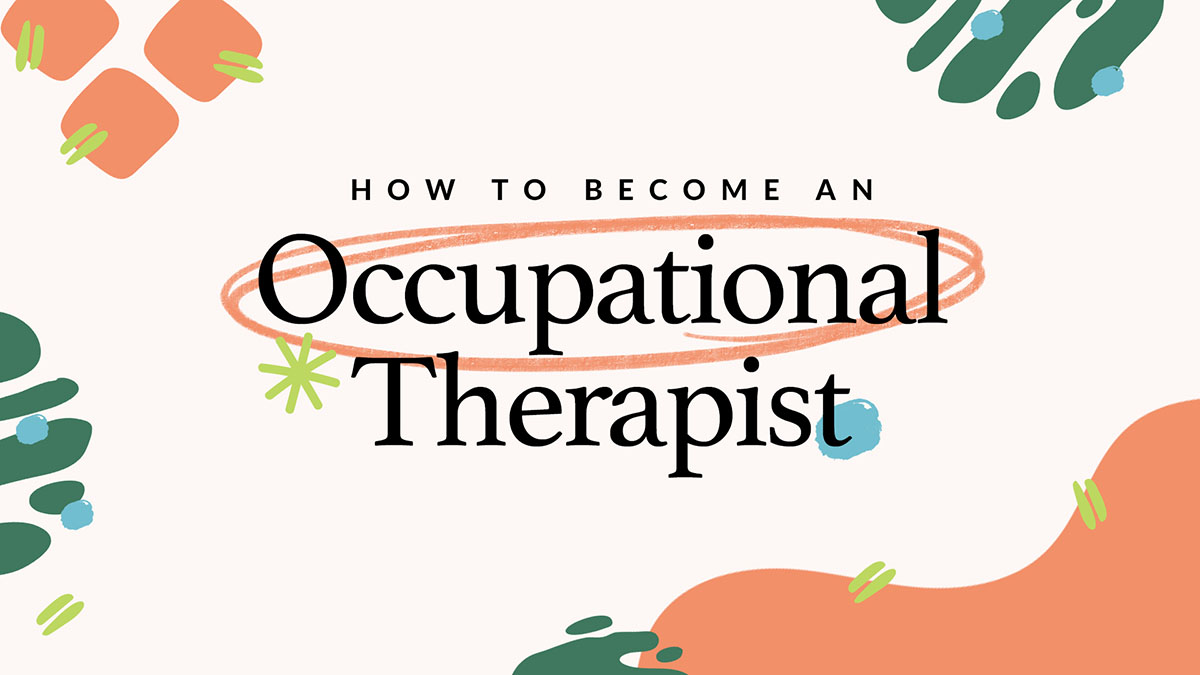
Do you enjoy helping others improve their lives—especially when they struggle with health challenges? Do you love science and working with people? Are you a creative, holistic thinker who feels best when helping others live their best lives?
If so, a career as an occupational therapist (OT) could be the right choice for you!
In this article, we will cover the following to help you decide whether you’d like to pursue a career in occupational therapy:
- 5 basic steps to becoming an occupational therapist
- What is occupational therapy?
- What, exactly, does an occupational therapist do?
- What skills does an OT need?
- Should YOU become an occupational therapist?
- What level of education do you need to become an OT?
- What is the best undergraduate major for OT school?
- Top occupational therapy schools
- How to pick an occupational therapy school
- Are occupational therapists in high demand?
- How much money does an occupational therapist make?
5 basic steps to becoming an occupational therapist
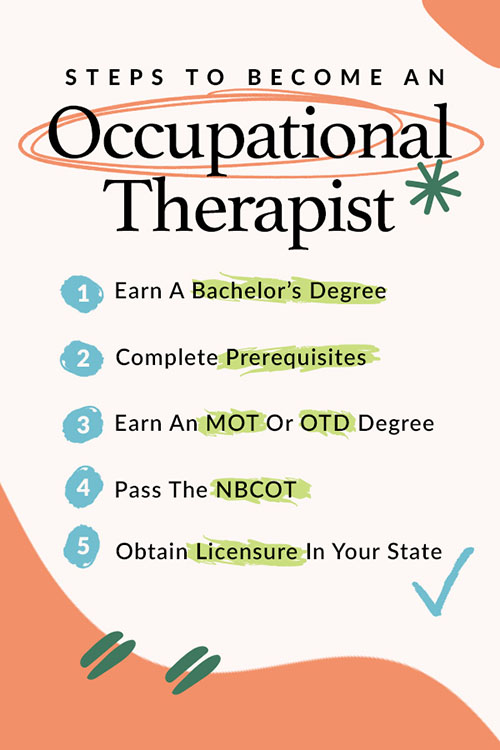
To begin, here are the 5 basic steps for becoming an occupational therapist. Keep scrolling to learn more about the nuance and details of a career in occupational therapy.
Step 1.) Earn a bachelor’s degree
The first step to becoming an occupational therapist is completing the educational requirements for acceptance into OT school. That means earning a high school degree and an undergraduate degree—as well as completing the proper prerequisite coursework.
Step 2.) Complete pre-requisites, like observation hours and (probably) the GRE
While you are working on your undergraduate degree, may need to start logging the required volunteer/observation hours for occupational therapy school. Each program has its own requirements, but you’ll generally want to work in at least a few different settings, and it’s also wise to explore different types of patient populations. (You can search for OT offices in your area on our OT Directory!)
In addition to earning relatively high marks in your undergrad program, you will likely need to take the GRE (graduate record examination) and pass with a decent score. Please check with the individual programs you are interested in to see if the GRE is required.
Step 3.) Decide between a MOT and OTD program, apply, and earn your degree
This is a big step. 🙂
You’ll need to decide whether you want to pursue a master’s degree or a doctorate degree. There are pros and cons for each. Again, please read up on the difference between these degrees before making your decision.
You can use the Occupational Therapist Centralized Application Service (OTCAS) to apply to multiple schools. Here are some tips for navigating that process.
As you make your way through OT school, be sure to come back to OT Potential—we have tons of great resources for students!
Step 4.) Pass the NBCOT
Once you complete your occupational therapy degree, you’ll need to pass the national board exam (from NBCOT).
Step 5.) Obtain licensure in your state
You’ll also need to apply for licensure in the state(s) in which you seek to practice.
You will then need to take continuing education courses throughout your career to keep your license active. (This is the case in nearly all states, though there are a few exceptions.)
What is occupational therapy?
Occupational therapy (OT) is a form of rehabilitation that helps people change their habits to change their health. Occupational therapists (OTs) focus on providing patient/caregiver education, supporting participation in everyday activities, and adapting the patient’s environment as needed.
OTs are considered allied health professionals. They work alongside physicians, physician assistants, nurses, physical therapists, speech therapists, respiratory therapists, and many other health practitioners to help patients achieve the best possible care outcomes. OTs collaborate with these fellow health providers to deliver holistic care to patients who have suffered from debilitating illnesses or injuries.
OTs are unique in that they use evidence-based interventions to help patients participate in the activities they find most meaningful. That means the care delivered by OTs is extremely holistic and tailored to each individual patient. While other rehabilitation professionals are also trained in helping patients regain function, OTs are unique in their ability to address both mental health and social determinants of health. In essence, OTs truly take a whole-person approach to care delivery.
If you are looking for a basic overview of OT, I highly recommend checking out our guide: What is OT?
If you are curious about the similarities, differences, and interdisciplinary opportunities within the standard rehabilitation team, check out our guide: OT vs. PT vs. SLP: Similarities and Differences.
What, exactly, does an occupational therapist do?
If you’re considering a career in OT, it’s very important that you truly, completely familiarize yourself with occupational therapists’ work. This is a critical step before you decide to invest the time, money, and energy needed to enter the profession.
An OT’s day is usually spent working with a series of patients on a set schedule. OTs evaluate and assess patient needs, then create and follow therapy plans of care (POCs) consisting of discrete goals for functional recovery. Much of an OT’s job involves troubleshooting patient challenges and determining the right types of interventions to address those problems.
The types of interventions and care plans that an OT selects are tailored to each patient’s unique needs—but patient needs span a wide spectrum, and there are many types of treatment approaches and settings OTs can specialize in. For example, in this post, you can see a long list of evidence-based pediatric interventions.
Here are a few of the most common settings in which occupational therapists work:
It’s worth noting that OTs spend quite a bit of their time filling out paperwork, too. Each patient’s case must be documented, and the documentation rules and frameworks set forth by different payers and regulatory entities can be very involved. That means that occupational therapists realistically spend a significant portion of each day writing notes about cases and communicating with other members of the care team.
What skills does an OT need?
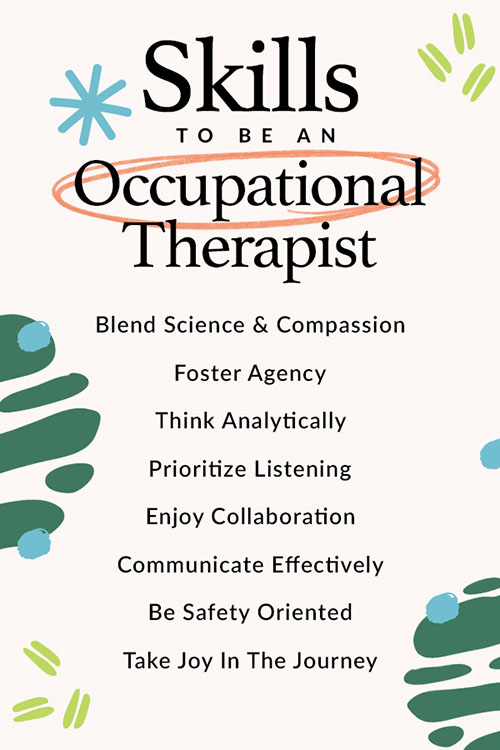
Occupational therapists blend science with a healthy dose of compassion and creativity. OTs need to be somewhat analytical, but also patient and encouraging. They should enjoy science (especially anatomy and kinesiology) and like working with the general public. OTs need to be excellent listeners and problem-solvers, and they also need to know how to teach others new concepts and skills.
Much of what an OT does involves educating patients, family members, and caregivers—so it’s vital that OTs understand how to effectively communicate and educate.
OTs also need to be very safety-oriented. One of the biggest issues that fieldwork coordinators (the ones providing real-life clinical experiences to OT students) face is students’ lack of safety awareness. Much of an OT’s job centers on keeping patients and family members safe, which can be a challenge. From teaching family members how to safely assist with bathing and toileting, to demonstrating safe use of medical equipment, a huge focus of OT is promoting safety awareness.
Lastly, a good OT should be able to work collaboratively with others on a multidisciplinary team. Much of an OT’s work involves providing a holistic perspective on what a patient truly wants out of the recovery process. So, it is important that they can effectively communicate patient and family member needs and goals to a variety of different medical providers.
Should YOU become an occupational therapist (OT)?
This is the million-dollar question, isn’t it? OT is incredibly fulfilling work, but there are some important factors to consider before choosing a profession that puts others’ needs first.
You’ll want to consider the cost of education and training, the physical and emotional demands of the job, whether you enjoy being around people all day/every day, and how well you cope with working with an injured and/or ill population.
Potential pros of being an OT
Career advancement
If you become an OT, you will have opportunities for advancement in your career. You can become a clinic owner, or you can opt to specialize and remain an employee. You can also pursue a number of different non-clinical (or alternative) OT careers. While there is certainly growing market saturation in desirable cities, it’s still very possible to make a good living as an occupational therapist, especially in small cities and rural locales.
The other benefit of having a wide scope of practice is that there are many settings in which you can work—and many OTs do wind up switching settings when they’re ready for a change of pace. For example, it is common to work in more demanding settings, such as SNFs and acute care, right out of school. However, once their student debt is paid off, some therapists find themselves transitioning to pediatric, outpatient, or mental health settings.
Fulfillment
As noted previously, OT is very fulfilling. You are working with patients when they are at their most vulnerable, and you are teaching many of them skills that enable them to build lives they feel are worth living. That is priceless, and many OTs form long-lasting relationships with patients and their families.
I always think it is worth noting that OT is a popular second career. Many seasoned professionals are attracted to the meaningful nature of occupational therapy work.
Stability
Another nice thing about occupational therapy is that it’s fairly easy to find OT jobs anywhere you go. Yes, you might have to get licensed in a new state, and yes, you might take a pay cut if you move to a saturated market, but it’s rare to simply have no luck at all landing an OT job.
Flexibility
Occupational therapists also enjoy a decent amount of flexibility in their jobs. Many professions pretty much require you to work full-time. Otherwise, you’ll have a very difficult time finding work. However, OTs who need more flexibility in their schedules are often allowed to go part-time or PRN (i.e., working as-needed shifts). Just keep in mind that this might impact pay and benefits!
Potential cons of being an OT
Stress
If you’re wondering how stressful it is to be an OT, it really depends. There are certain settings where OTs are required to be very efficient with their time, which can lead to higher-than-average job stress. However, there are other environments where you can set your own schedule, which often helps with stress management.
Increasing productivity demands
Like most healthcare practitioners, occupational therapists are dealing with increased documentation requirements and shrinking reimbursements. And yet, there’s still pressure to see the same number of patients per day—and those additional administrative tasks can start piling up. This has led many OTs to work long hours, decreasing their overall pay per hour. For this reason, some OTs are starting to create specialized cash-based OT practices. These practices can be challenging to operate, however, as patients must be convinced that you’ll deliver commensurate value compared to insurance-based practices.
Physical and emotional demands
Occupational therapy can be a heartwarming job, but it can also be physically and emotionally demanding. For this reason, many OTs experience burnout at some point in their careers. However, OT is such a diverse profession that it is relatively easy to switch settings or work in non-clinical OT jobs.
Debt
Unfortunately, becoming an occupational therapist is not cheap, which means many OTs find themselves managing student debt. Occupational therapists must complete at least a master’s degree program—on top of any expenses associated with their undergraduate education. While debt can certainly be managed through frugal living and wise school selection, many OTs do find themselves in quite a bit of debt upon graduation. This can add to stress related to the job itself.
The good news is that, unlike physical therapists, you’re not required to get a doctorate degree in order to apply for licensure. If you’re concerned about debt load, one option is to become an occupational therapy assistant (OTA), which only requires an associate’s degree.
What level of education do you need to become an OT?
As I noted in the previous section, occupational therapists are highly educated.
While some OTs are grandfathered in from the days when a bachelor’s degree was standard, a master’s degree is now required as entry-level OT education. In many schools, a doctorate (OTD) is also being offered as an entry-level degree.
Choosing whether to pursue a master’s or doctorate as your entry-level degree is a major decision. And, we highly recommend reading up on the advantages and downsides of both. In fact, we dedicated a whole post to this decision: Which OT Degree? (OT, OTD, PPOTD & More!)
How long do you have to go to school to learn how to become an occupational therapist?
I’ll be straight with you: A long time!
In most cases, you’ll need to complete an undergraduate degree (which takes four years, unless you graduate early or pursue an accelerated program), and then you’ll be in occupational therapy school for two to three years.
During that time, you’ll also go on fieldwork assignments, where you’ll work with patients as an occupational therapy student (OTS) under the supervision of a licensed OT.
One thing to keep in mind is that each state in the US has its own rules and regulations for practicing as an OT. You need to get an OT license for any state in which you want to practice, and each state has its own unique requirements for both initial licensure and license renewal.
What is the best undergraduate major for OT school?
If you are seriously considering a career in occupational therapy, you will want to take OT school prerequisites into account as you complete your undergraduate degree. I would start by looking up various OT schools to see exactly what their prereqs are.
For example, to get into the program I attended at NYU, I had to take the following courses:
- Developmental Psychology (this course should cover the lifespan)
- Abnormal Psychology (this course should cover the lifespan)
- Behavioral Sciences (one additional social science course)
- Human Anatomy and Physiology I and II (with labs)
- Elementary Statistics
It’s worth noting that my science prerequisites had to be completed within the previous ten years, and NYU would not accept online (or even hybrid) science prerequisites.
As you can see, these courses may lend themselves to a psychology or science major as an undergraduate. That being said, I always encourage people to pursue whatever undergrad major is interesting to them.
There is a good chance you can get all of the prereqs in regardless of your major. For example, I was a religion major in college. For me, this was the perfect preparation, because it helped me get a high-level perspective on how humans experience meaning and craft their lives accordingly. And, a key to occupational therapy is understanding how people do this on a personal level, so we can help them participate in the lives that are most meaningful to them.
Top occupational therapy schools
There are tons of different occupational therapy schools across the US. While some are considered better than others (in terms of how selective they are, the accolades of their staff, etc.), I recommend that you take rankings with a giant slab of salt. That’s because there’s no evidence that graduating from a highly ranked school yields better job opportunities or higher pay upon graduation. Instead, an impressive OT resume and solid fieldwork assignments are more likely to help you stand out as a new-grad OT candidate.
If you’re still focused on attending a “top” OT school, below are the 20 highest-ranked OT programs, according to US News and World Report. (You’ll see there were lots of ties for rankings!)
- (1) Boston University
- (1) University of Pittsburgh
- (3) University of Illinois—Chicago
- (3) Washington University in St. Louis
- (5) University of North Carolina – Chapel Hill
- (5) University of Southern California
- (7) Colorado State University
- (7) Columbia University
- (7) New York University – OT Directory Partner
- (7) Thomas Jefferson University
- (11) Ohio State University
- (11) Tufts University
- (11) University of Florida
- (14) Medical University of South Carolina
- (14) Virginia Commonwealth University
- (16) MGH Institute of Health Professions
- (16) Texas Woman’s University
- (16) University of Wisconsin—Madison
- (19) Creighton University
- (19) Quinnipiac University
Honestly, instead of focusing on rankings, I would encourage you to ask yourself: Are the alumni from the school doing the work that YOU aspire to? You can see alumni from OT schools across the country on our OT School Guide.
Partner OT Schools

How to pick an occupational therapy school
I recommend exploring the mission and philosophy of each occupational therapy school you are considering. Dig deep to find out what the program values in terms of its curriculum and vision for OT.
I found it really helpful to read the biographies of faculty members on each school’s website. This gives you a sense of who they are and what kind of research interests them. If you can find a program where the professors’ interests align with your own, that is ideal!
Other factors to consider include:
- Whether the program offers a master’s degree or a doctorate degree
- Location (including the cost of living)
- Price
- Quality and breadth of fieldwork opportunities
- NBCOT pass rates
- Class sizes
- Program completion rate
- Job placement assistance
- Facility and equipment
I strongly recommend digging into the cost of the program you’d like to attend. That’s because, as noted above, there really isn’t a correlation between a school’s reputation and what you’ll get paid when you graduate—plus, you’ll enjoy your role as an OT way more if you’re not constantly stressing out about paying off your student loans.
Are occupational therapists in high demand?
According to the Bureau of Labor Statistics (BLS), occupational therapy jobs are on the rise, with employment of OTs projected to grow 11% between 2023 and 2033. This rate is much faster than the average projected growth of jobs in the US.
That said, there are certain cities where the OT market is more saturated than others. In large cities and locations with occupational therapy schools, demand for OTs generally won’t be as high as it is in rural areas.
How much money does an occupational therapist make?
As you weigh your earning potential, keep in mind that numerous factors may impact your salary as an OT. Years of experience, specialization, location of practice, and setting all affect your compensation. Also, some employers pay hourly rates, while others pay salaries.
We did a TON of research and created the most comprehensive article about OT salaries around! Based on data we pulled from numerous sources—as well as our own calculations—we found a national average OT salary of $98,833/year. You can see that OTs do pretty well financially, but what those numbers don’t show is that occupational therapists tend to have a pretty poor debt-to-income ratio.
Also, because so much of an OT’s salary hinges on insurance reimbursement rates, many therapists are disappointed to find that even though they work hard, they don’t always reap the rewards in terms of raises or bonuses.
Conclusion: Map out a plan and follow it
Becoming an occupational therapist is hard work, but it’s worth it. I recommend that you start planning sooner rather than later. If you focus early on obtaining good grades, high GRE scores, and impressive volunteer work, you’ll have a better chance of being accepted into the school(s) of your choice.
Be sure to stay on top of current trends in the OT field as you pursue your dream. There are always new developments and creative ways to use your education, and the earlier you start thinking about your goals within the OT realm, the sooner you can take advantage of everything your OT school has to offer.
Best of luck, and I can’t wait to see you in our wonderful profession!













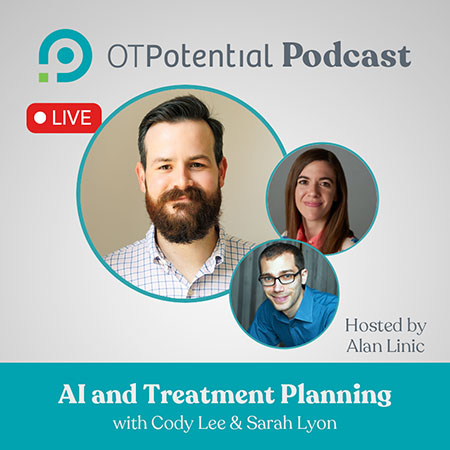
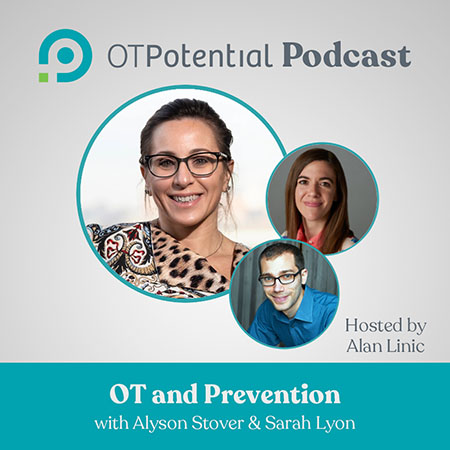
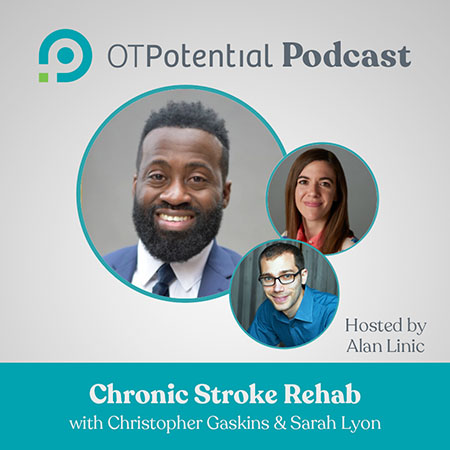



27 replies on “How to Become an Occupational Therapist (2025)”
Hello, I agree that the typical manner in which to become an OT is to go to an university. Deciding to become an OT vs an OTA is a personal choice. However, as an OTA Program Director in an urban area (in Ohio), this is not always a financial choice. Our program stresses that we are NOT a gateway to becoming an OT because being an OTA is a great career in its self! But, each class has 1-3 students who do plan on going on to becoming an OT-they just need to be working to be able to afford the cost associated with, at minimum, a Master’s degree. We are fortunate that there is an university about 60 miles south that now offers a bridge program for only OTAs to get their BS (a completely online program) & then to apply for the Master’s Program. As someone who was a first generation college student, I became an OTA, worked for 5 years & then went on to become an OTR & now am the OTA Program Director in the same Community College. I wouldn’t trade this path…each professional level is educated/trained in slightly a different manner. It is not for the majority but for many, often the non-traditional student, this path gets them to the goal!
Hi Heidi! I’m so glad you brought this perspective to the post. I had mentioned in my email that I was frustrated with the other advice out there that advised people to become an OTA then an OT, what really made me frustrated was they took all the nuance out of the decision. All paths have merit and a career journey is so personal, so I think that at each step people should be presented with quality information and weigh what is right for them. I LOVE your story, and thanks again for sharing it. I bet you are an awesome program director because of your experience!!
YES, I want to be a occasionally therapist.
Being a COTA that bridged to OTR, I whole heartedly agree to choose one path.
I have been frustrated with the transition process for many years and have voiced this many times. I wish as a profession, we could make this process easier for those who after attaining their COTA degree and worked for a little while could be an OTR. I feel that with a revision to coursework on both sides we could align the programming. If nursing can do it we can too!
I hear you! When I’ve researched the bridging option, I was surprised at the cost and lack of streamlining. If anyone is stumbling on this thread, and wants to know more about bridging, we did a little overview of it in this article: https://otpotential.com/blog/where-to-go-with-a-cota-degree
Thanks for writing this highly informative article Sarah! So much helpful information for pre-OT students here. I’ve added it to our list of recommended resources for students over on our website at Outdoor Kids OT! Keep up the great work!
Awww! Thank you, Laura!! I ALWAYS appreciate a backlink. They make a big difference in how well my articles rank on Google!
This is a fantastic article! Thank you for writing it and providing solid, accurate information about our profession. A number of pre-OT students have asked me the best route to become and OT or a COTA. I will certainly be sharing this article in the future.
I’ve really been looking into becoming an OT and this article was SO helpful! It was nice to have it all laid out as far as the process goes.
This is very helpful. Thank you. I do have a question that I hope someone can answer or give me some direction. I am researching for my daughter who would like to become an OT, and we homeschool, so I thought that we would have her get her AA and OTA through dual enrollment. I understand that the OTA isn’t necessarily a stepping stone, but a career itself. However, since she will only be 18 when she earns her OTA, I thought it might be helpful in her application into a dual bachelor’s/master’s program. Am I on the right path? I would love any and all thoughts and suggestions. Thank you, again.
Just what I needed!
if i take medical studies for my bachelor’s degree, can i take occupational therapy as my postgraduate studies? i am from Indonesia and i hope to take my postgraduate overseas. thank you for your answer:)
If youre in High school and youre able to take college classes… What classes do i need to take in college?????
i know i have to take psycology but what else do I need to take and how much time…..
hey im also a junior in high school and I’ve already taken ap psych. for my senior yr im planning on taking physiology or human anatomy.
I already have a bachelors degree, but I don’t have any of the pre-reqs. What do I do if I need to get a post-bac? Where are the best programs for that?
Take the pre-reqs at your local community college. Most OT schools will accepts online pre-reqs, so take them all online if you can. That way you can work (saving money) and continue to live a normal life while preparing for OT school. Good luck!
I’m planning to take an occupational therapist course, but until recently I have doubts if I should push through with it or not. I want to be part of the rehabilitation end of a therapy session, especially in helping people regain their operational ability in life. Your article gave me a great overview on what to expect if I am to through this course. I’m glad that I’ve seen this article. Hopefully by the next school year, I’ll continue my studies and will definitely take this route and become part of this field in therapy studies.
way to go Maddie!! i wish you all the best 🙂
Hello, I have a Masters is Child development and am interested on OT what would be the path for me to get started ?
Hey Jocelyn! Sorry I am so slow to respond to this! We have a another article on OT as second career you might find helpful! For someone like you, you may have to get really granular and look at specific programs, and what credits you have already earned that would transfer as pre-reqs. https://otpotential.com/blog/ot-as-a-2nd-career
Hi. I recently retired from the military where I served as a military working dog handler. During that time, I completed a BA in Psychology and am currently in my final class for a MA in Developmental Psychology. I have been weighing exactly what I want to do now as a civilian and am seriously considering occupational therapy. Is that feasible with my current education, and is there a recommended plan (and expected timeline) for pursuing an MA in Occupational Therapy? Thank you.
Hello, I’ve been helping my daughter research where we can afford to send her to get a master’s degree after she graduated Pre-OT track from Baylor but every program seems to be turning into Doctorate which are longer programs and more expensive! She does not want to teach, she would prefer to work with pediatric special needs kids. She has all her pre-rec courses completed on the Pre-OT track but the list she got shows only 4 master’s programs available out of 10 schools in Texas. Why is everything turning to Doctorate? She just wants a master’s but feels the road is more limited now and may switch paths to OTA, ABA, or something else after graduation in 2023. What would you recommend for her and us as parents encouraging her to still achieve her dream?
D, look for programs that are still at a Master’s level. I teach at an MSOT program in Winston-Salem, NC. Our program has been at a Master’s level since 2005 and is considered a very good value-based program. Check out Winston-Salem State university’s MSOT program.
I have just completed my a levels and I am exploring OT. Being in Pakistan where OT is not a very studied field, your article was really helpful and answered most of my questions.
Thank you!
I work as an RBI in an ABA clinic right now and am about to graduate with a BS in Psychology. What is the best way for me to gain experience in OT before applying to a Master’s program?
Also, my grades are over a 3.0 but under a 3.5 because I had a couple of bad terms during the pandemic. Do I still have a shot at an OT master’s? I have worked with special needs kids for 6+ years and I am volunteering in a behavioral neuroscience lab on campus as a Research Assistant at well, but I feel that I need experience in the OT realm to make my application more viable and I’m not sure where to start!
This article is very informative, thank you! I would really appreciate your opinion. I have a BA in Applied a behavioral Science. Would moving into MOT be beneficial. I honestly feel like this career choice would be great because the major reason I got into psychology was to be able and help others improve their lives.
I’m currently about to get an occupational therapy diploma in Poland, it’s a scholarship opportunities,but all I’ve heard people saying is a bachelor degree and master’s and doctoral, I’m really glad to come across this article, if any one could guide me, should I go and pursue this diploma or it’s going to be waste of time and might be difficult to get a job and switch in future?